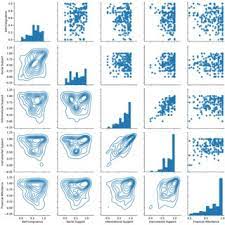Exploring Organizational Behavior in Tourism
Exploring Organizational Behavior in Tourism is a field of study that examines how individuals and groups within an organization behave, interact, and influence one another. It involves analyzing the dynamics of human behavior, organizational structures, and the impact of various factors on employee performance and satisfaction. This essay aims to understand organizational behavior using relevant theories, concepts, and frameworks. Moreover, it will showcase examples from the tourism sector to illustrate the practical application of these theories.
Motivation in Tourism Sector while Exploring Organizational Behavior in Tourism
In Individual Behavior, two theories help in Exploring Organizational Behavior in Tourism:
Maslow’s Hierarchy of Needs: Maslow’s theory suggests that individuals are motivated by a hierarchy of needs, ranging from basic physiological needs to higher-level needs like self-esteem and self-actualization. Understanding and addressing employees’ needs can contribute to their motivation and job satisfaction in tourism. For example, providing competitive wages, ensuring safe working conditions, and offering opportunities for personal growth can enhance employee performance and loyalty.
 Motivational Psychology Diagram.
Motivational Psychology Diagram.
Expectancy Theory: The expectancy theory, proposed by Victor Vroom, emphasizes that employees’ motivation is influenced by their expectations of achieving desired outcomes. This theory can be applied to employee performance and rewards in tourism. For instance, if employees perceive that their efforts will lead to recognition, incentives, or career advancement, they are more likely to be motivated and take higher action.
Group Dynamics in Tourism while Exploring Organizational Behavior in Tourism
For group behavior, different theories explain it.
First is Tuckman’s Stages of Group Development: Tuckman’s model suggests that groups go through several stages: forming, storming, norming, and performing. In the tourism sector, understanding these stages can help managers foster effective teamwork. For example, managers can facilitate team-building activities during forming to help employees get acquainted and establish rapport. Recognizing and managing conflicts during the storming stage is crucial to ensure the group successfully moves towards norming and performing scenes.
Moreover, the Social Identity Theory: Social identity theory posits that individuals derive part of their self-concept from their groups and strive to maintain positive group identities. This theory is relevant to employee engagement and organizational culture in the tourism sector. For instance, promoting a positive corporate culture that emphasizes inclusivity and recognition can foster a sense of belonging among employees, leading to increased job satisfaction and productivity.
Leadership and Organizational Effectiveness while Understanding Organizational Behavior
Transformational leadership focuses on inspiring and motivating employees by creating a compelling vision and empowering them to achieve their full potential. In the tourism sector, transformational leadership can positively impact employee performance. For example, a tourism company leader who communicates a clear vision of providing exceptional customer experiences and supports employees’ professional growth can foster a motivated and engaged workforce.
Organizational structure and communication channels significantly influence behavior and performance within an organization. A flat organizational structure and open communication channels in the tourism sector can facilitate information flow and collaboration. For instance, a hotel with a decentralized system that encourages frontline employees to share guest feedback and suggestions can lead to prompt problem-solving and enhanced guest satisfaction.
Motivation and Job Satisfaction in Tourism while Exploring Organizational Behavior in Tourism
Herzberg’s Two-Factor Theory explains motivation and job satisfaction. Herzberg’s theory distinguishes between hygiene factors (salary, working conditions, and company policies) and motivators (recognition, achievement, and growth opportunities). In the tourism sector, understanding this theory can help identify factors that contribute to employee job satisfaction. For example, a travel agency that provides opportunities for skill development and recognizes employees’ achievements will likely experience higher motivation and satisfaction levels.
The job characteristics model suggests that employees experience higher motivation and satisfaction when enriched with specific characteristics: skill variety, task identity, task significance, autonomy, and feedback. In the tourism sector, organizations can design job roles that incorporate these characteristics. For instance, tour guides who have the freedom to create unique experiences, receive customer feedback, and perceive the significance of their role are more likely to be motivated and satisfied.
In conclusion, Exploring Organizational Behavior in Tourism is essential for effective management and achieving organizational goals. By applying theories, concepts, and frameworks in the context of the tourism sector, organizations can improve employee motivation, job satisfaction, and overall performance. The examples provided demonstrate the practical application of these theories, reinforcing the importance of considering organizational behavior principles in the tourism industry and beyond.
References:
- “Work-Life Balance and Organizational Behavior in the Tourism and Hospitality Industry” by Ivana Bosnić and Ivana Načinović Braje (Conference Paper):
- The Role of Organizational Culture in the Tourism Industry” by Mahmut Karakus and Cengiz Demir (Journal Article):
- Cetinel, F. (2019). The Impact of Organizational Culture on Organizational Performance: A Study on Hotels in Turkey. Journal of Tourism and Gastronomy Studies, 7(1), 131-148. [Link: https://dergipark.org.tr/en/download/article-file/693399]
Exploring Organizational Behavior in Tourism





